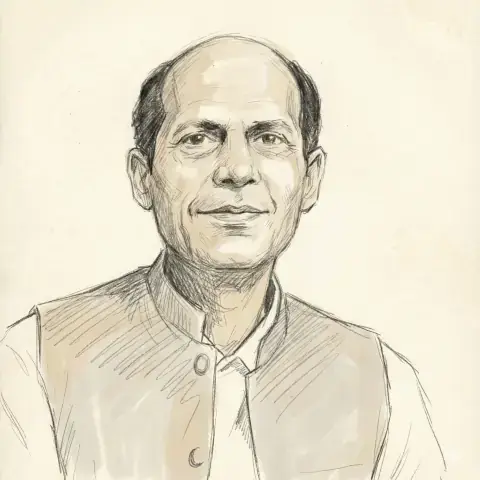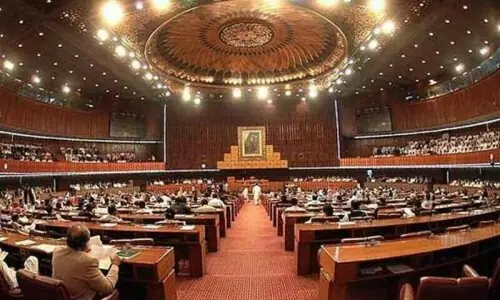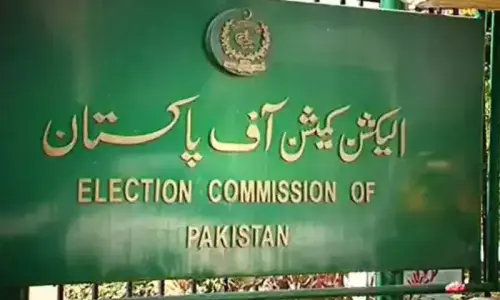 ISLAMABAD, Dec 12: An Indian journalist and former member of the Rajya Sabha Kuldip Nayyar has proposed a self-governance based formula to solve the lingering dispute between his country and Pakistan over Jammu and Kashmir.
ISLAMABAD, Dec 12: An Indian journalist and former member of the Rajya Sabha Kuldip Nayyar has proposed a self-governance based formula to solve the lingering dispute between his country and Pakistan over Jammu and Kashmir.
“All subjects except defence, foreign affairs and communications should be given by Pakistan and India to parts of Kashmir under their control,” Mr Nayyar said in a lecture on the theme of ‘possible options on Kashmir’.
The lecture was organized by the Eqbal Ahmed Foundation in collaboration with the South Asia Free Media Association (Safma) on Monday.
Underlining the importance of people-to-people contacts, he said the border between India and Pakistan should be softened. He said elections on both sides of the divide should be held so that representatives of the people could be identified. The elected representatives of Azad Kashmir should be allowed to sit in the Lok Sabha and those elected on the other side of the divide should be permitted to sit in the National Assembly.
Mr Nayyar said that what he had proposed was not a solution-in-transition, but a permanent settlement of the long-standing dispute. He said demilitarization of the entire Jammu and Kashmir was part of his formula. He, however, said demilitarization was possible only after ‘infiltration’ from Pakistan was brought to an end.
He said South Asia would some day become like Europe. “One day we will be proud of being South Asian,” he said.
According to Mr Nayyar, both India and Pakistan should also have mutually beneficial trade between them. India should be able to transfer technology to and have joint ventures with Pakistan.
He said the core problem was mistrust and suspicion and warned that “if that is not given up, there will be another Kashmir”. “Kashmir is a symptom and not a disease.”
Mr Nayyar was of the view that both India and Pakistan had made wrong decisions when they went nuclear.
He disclosed that before the Kargil conflict, the then Indian Prime Minister Atal Bihari Vajpayee and his Pakistani counterpart Nawaz Sharif had been close to a settlement of Kashmir dispute. He said he did not have the details of what had been agreed between the two sides, but Mr Vajpayee had told him that the two sides had almost finalized a settlement through back-channel diplomacy.
In reply to a question, Mr Nayyar said that draconian laws like TADA and POTA should be repealed. “The violation of human rights in inexcusable,” he remarked.
The director general of the Institute of Regional Studies, Maj Gen (Retd) Jamshed Ayaz, while speaking on the occasion, said that composite dialogue between India and Pakistan over resolution of outstanding problems was moving at a snail’s pace.
Mr Ayaz, however, said it was a happy sign that the leadership on both sides had called the peace process irreversible.
“There has to be a compromise solution and it has to be on quid pro quo basis…Pakistan is open to all viable options on Kashmir,” he said.
One of the options was a zonal plebiscite, under which Jammu and Kashmir can be divided into different zones, on the basis of religion, and on the basis of geographical location and cultural linkages, he added.
Mr Ayaz noted that it was the right time to carry out demilitarization on both the sides of the divide and send a message to Kashmiris that both the countries wanted a peaceful settlement. According to him, self-governance followed by demilitarization was a step in the right direction but not a permanent solution to the Jammu and Kashmir dispute.
Safma’s secretary general Imtiaz Alam called for developing a dialogue across the civil society and opined that there should be no restriction on free movement of people across the Line of Control.
In response to a question posed by a nationalist leader from Gilgit Nawaz Khan Naji, he said the people of Northern Areas should also be given all basic human and democratic rights, including the right to self-rule and be included in any future dialogue on Kashmir.
He regretted that the area had so far been treated as a colony and denied all basic rights.


































